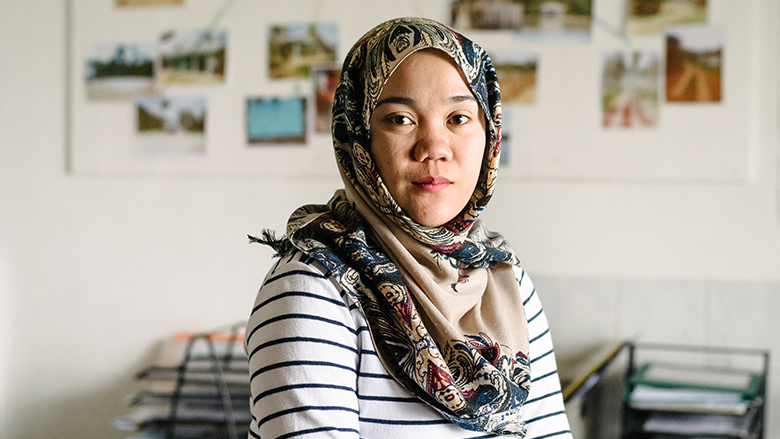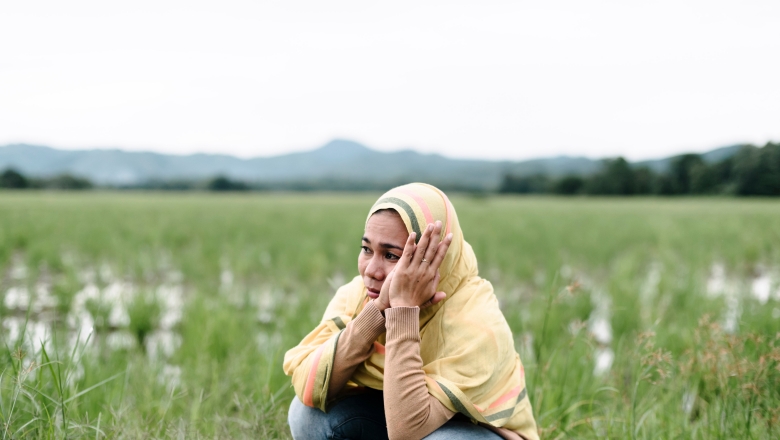Amina H. Aban, 28, is the daughter of a well-known rebel commander of the Moro Islamic Liberation Front (MILF). She met her father just three times before he was killed in combat; she was in Grade Six at the time. Despite her loss, and driven by a passion for education and change, Amina completed her schooling. She holds a Bachelor of Science in Islamic Studies and is also a qualified teacher.
Today Amina is employed by the Bangsamoro Development Agency (BDA) to work with communities in conflict-affected areas in Mindanao, southern Philippines. She has helped bring infrastructure projects to isolated Muslim communities who, like her own community, have suffered from years of violent conflict and very little development.
“I started in Bangsamoro Development Agency (BDA) back in 2012 and was really glad when I was assigned to three villages in Sirawai, my home.”
“I thought being a community organizer [in Sirawai] would be an easy job but I struggled because they [the community] were hesitant about development. I am still young and the community organizations I’m working with are composed of my elders – aunties, grandfathers, grandmothers and uncles – so it’s hard. When I raise my voice, it’s like they’re telling me, ‘Hey, you are being proud now’, but if I am lenient with them, I can’t explain [the BDA purpose] properly.”
“When I went in my father’s camp [the MILF had a base in the mountains nearby], where you can find the water source needed for the project, I couldn’t easily make them understand. They told me, ‘You were supposed to be the first one to hide your father’s camp, but now, you even invited other people inside’. I explained to them, but they were close-minded.”
“Even before [the war], water was always Sirawai municipality’s problem. In 2014/2015, [because of the BDA project] they finally had access to water and it benefitted the entire municipality which is made up of 32 barangays (villages). The first thing I said was, ‘See, I am not a traitor and I did not betray you’. I think my father would not have been angry that we had outsiders enter their camp. Imagine, it had been decades since they had been able to have access to water.”
“I was the one who surveyed the water source. Every time I had to go up [to the source, in the mountains], I really had to catch my breath. I would imagine my father, he would have gone up and down every day with his jungle pack that’s full of stuff and weapons. And then there’s me, not carrying anything.
My father, not once was he able to come to our home, never able to sleep in our house. Whenever we were asked by men in uniform where he was, we always said he was in Malaysia. They would come to our school, give us candy, make friends with us. Later on, they’d ask, ‘Where’s your father? Did your father go home? Did you see your father?’
I really thought my father was in Malaysia, but then we would write a letter in the morning and get a reply in the afternoon. How quick! It was only later that I found out that ‘Malaysia’ was really close, just in the next village.
My mother sent me to an orphanage to study when I was in Grade 6. I said, ‘Isn’t it that when you’re in the orphanage, you don’t have a father? Why am I being sent here?’ That’s when I found out that my father was gone.
Sometimes I think about my mother and it’s overwhelming. She lost her husband, her livelihood and her eldest son, a graduating civil engineer. I get my strength from her.
When I was young, I told myself that I will change people’s perceptions of us. That even if we were the children of a rebel, my father was different, we are different.
One of the reasons I joined the BDA is because of my father’s principle; what he was fighting for is the same as the BDA. The same as the MILF. [The community] used to think that I am the daughter who turned her back on her father because of the work that I do [for BDA]. But for me, I did not turn my back. I just used a different way. What my father was fighting for, is for everyone. What I’m doing is my contribution to that.
Perhaps, my only dream now is to have a family of my own. I would like my children to tell a different story. I don’t want to go back to the story of our history, of anger, of revenge. I want them to tell a story that isn’t based on my father’s story. I want it to be a nice one that is based on my life and my success."


